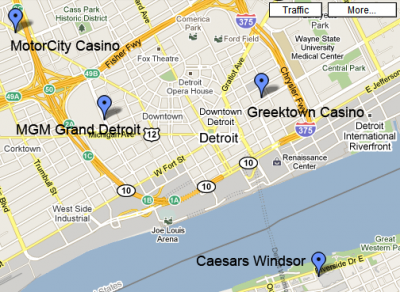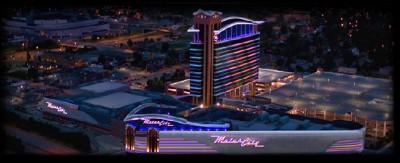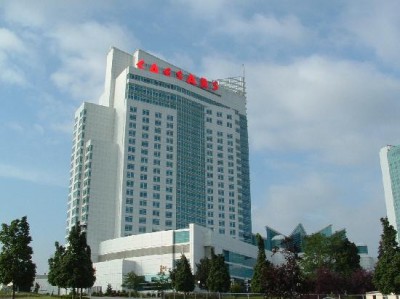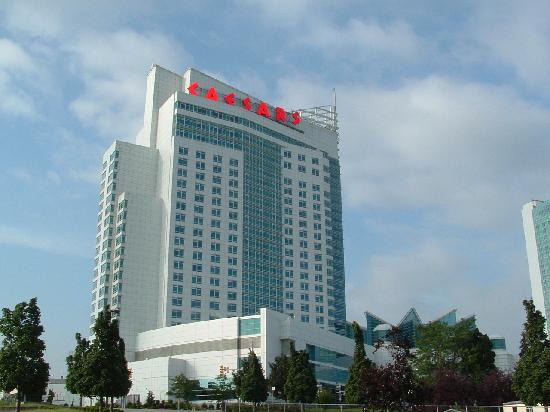 When people talk about Detroit, most are unaware that it is the largest metropolitan region in the US to offer casino resorts (unless, of course, they live around there, or they have read the city’s Wikipedia page). Although the casinos have provided a huge chunk of revenue to the City, it does not seem to be helping them create an effective budget that actually serves its residents.
When people talk about Detroit, most are unaware that it is the largest metropolitan region in the US to offer casino resorts (unless, of course, they live around there, or they have read the city’s Wikipedia page). Although the casinos have provided a huge chunk of revenue to the City, it does not seem to be helping them create an effective budget that actually serves its residents.
The first thing a person notices when he/she walks around Detroit is how empty and deserted it is — even though there are these beautifully constructed skyscrapers standing tall throughout the city. These skyscrapers are almost always abandoned and deserted, and they serve as a constant reminder that there was a time when Detroit was once one of the most prosperous cities in the country.
Another unsettling observation that you notice in Detroit is the lack of corporate chains/fast food restaurants in the city (and it pains me as a progressive to actually say that). It is a bizarre sight. Especially since those corporations are usually the first in line to abuse the economically disadvantaged. Yet, what you see on the streets is an empty city that even those motivated by greed are viewing as something of a lost cause because there is no wealth to exploit. The only lively thing about the City (besides the 15,000 people there for the US Social Forum) are the three casinos towering Detroit. So what is the deal here?
 One of the main driving forces for the development of the MotorCity Casino, MGM Grand Detroit and Greektown Casino was the establishment of the Caesars Windsor across the Detroit River in Winsor, Ontario, Canada. The residents of Michigan were afraid that they would lose a huge chunk of its tourism to Winsor. So in 1996, they voted for Proposal E, which authorized three casinos to be built and operated in the city of Detroit.
One of the main driving forces for the development of the MotorCity Casino, MGM Grand Detroit and Greektown Casino was the establishment of the Caesars Windsor across the Detroit River in Winsor, Ontario, Canada. The residents of Michigan were afraid that they would lose a huge chunk of its tourism to Winsor. So in 1996, they voted for Proposal E, which authorized three casinos to be built and operated in the city of Detroit.
 By looking at the tax numbers, the establishments of these three casinos seem to be a good idea for the state and the city. According to The Michigan Gaming Control Board, the big three casinos have been contributing a sizable income to the state and the city of Detroit in the form of wagering taxes and licensing fees. In 2009 alone, the Detroit casinos made a whopping $1.3 billion in total, which yielded $122 million for the state and $149 million for Detroit. These are pretty big revenue numbers, and it makes up about 11.1% of the City’s revenue stream. However, are these casinos actually helping the residents of Detroit?
By looking at the tax numbers, the establishments of these three casinos seem to be a good idea for the state and the city. According to The Michigan Gaming Control Board, the big three casinos have been contributing a sizable income to the state and the city of Detroit in the form of wagering taxes and licensing fees. In 2009 alone, the Detroit casinos made a whopping $1.3 billion in total, which yielded $122 million for the state and $149 million for Detroit. These are pretty big revenue numbers, and it makes up about 11.1% of the City’s revenue stream. However, are these casinos actually helping the residents of Detroit?
It is obvious that hardly any of this tax revenue is going back to the City’s residents. Just from a general observation of the players at the casino, most of them are senior local residents, people of color, who are there trying to stretch their social security checks and/or their minimum wage checks. We even heard a story of a mother who is there gambling so she can help pay for her studious son’s high school graduation that was being cancelled due to budget cuts. It was clear that she was not the only one there trying to make ends meet.
There is definitely something wrong with the way the City of Detroit is working if its residents are using the casinos as a way to make more money. These casinos were developed so it would create a constant revenue stream from attracting those outside of the locality. Yet, with the unemployment rate at 14.8% (April 2010) in the Detroit Metropolitan Area (not including the underemployed: part-time workers looking for full-time work, or those who have been unemployed for more than six months) these casinos are increasingly becoming a tool for the desperate to earn enough money to stay alive — it is a lousy tool at that as well, since everybody knows that the house always wins.
Detroit’s city government needs to figure out a way to reconstruct its economy, to utilize its already established infrastructure, so its residents wouldn’t be sucked into the temptation of making it big through the slot machines or a round of Black Jack. Something needs to be done, and maybe here is a good way to start thinking about it all.
